The Oil Kingmaker
Meet the man who helps oil-rich nations write their laws, then profits from them
Listen to this story
As the world staggers through heat waves driven by our addiction to oil and gas,
climate scientists like University of California, Berkeley’s Zeke Hausfather have come to coin a new term for the drastic rise in global temperatures we saw last year: “gobsmackingly bananas.” You can see why scientists are so concerned. By a “large margin,” 2023 was the warmest year on record.
In April 2023, before records were broken month after month, Munich Re, austere backers of many of the world’s insurance companies, said that it would no longer underwrite any new oil and gas developments and had set itself “ambitious decarbonization targets.” Joining in was the International Energy Agency, which said there should be “no new oil and gas fields approved for development” if the world is going to meet its greenhouse gas reduction targets agreed under the 2015 Paris Agreement.
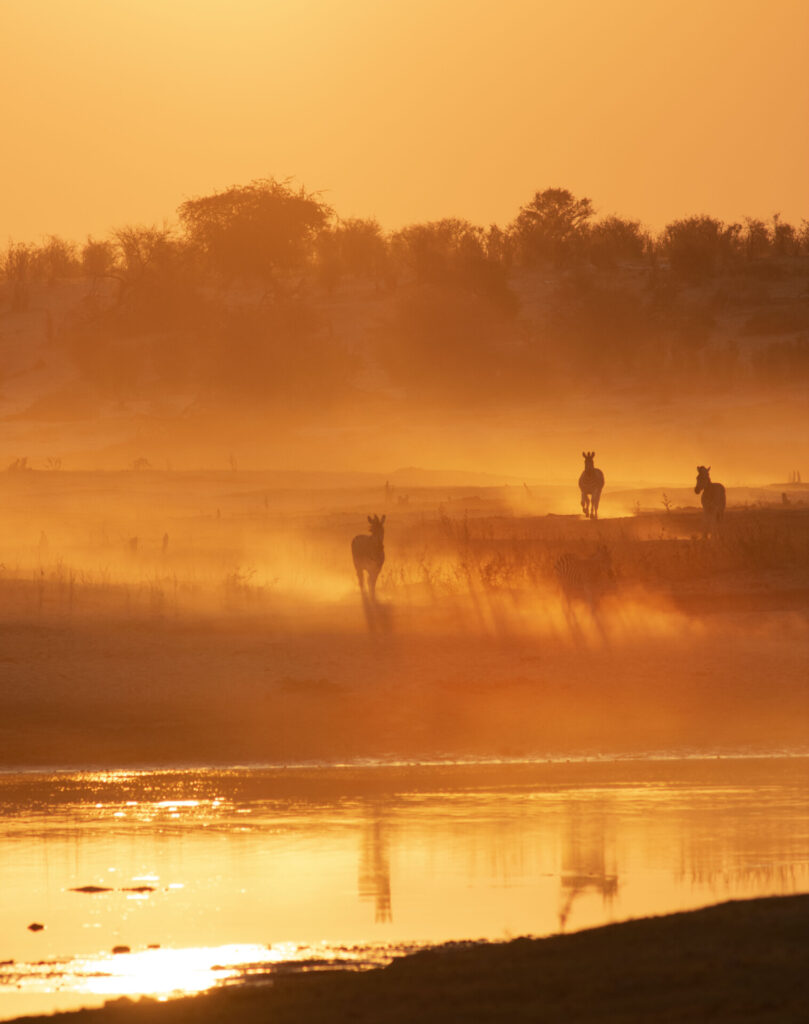
But it seems not all oil companies received the memo. Over the past three years, a seemingly obscure, small Canadian oil company named ReconAfrica has been trying to exploit what it calls “the last major onshore oil discovery on Earth.” The company has hyped that the license it holds in the southern African nation of Namibia could hold a whopping 120 billion barrels of oil, making it equivalent to the vast Permian Basin in west Texas and southeastern New Mexico. When the announcement came in 2021, the oil press salivated at the prospect of such riches.
“The numbers could be so high they would be laughable,” some claimed. Namibia, they said, could be a “once in a generation” oil find.

The problem is not only that 120 billion barrels of new oil would be catastrophic for the goal of ending new oil projects in the face of a warming world but also that the project is hanging like a sword of Damocles over the watershed of the Okavango Delta, one of the planet’s most beloved World Heritage Sites and a Key Biodiversity Area. The delta is one of the richest biodiverse places on Earth, supporting the world’s largest remaining population of iconic African elephants as well as lions, cheetahs, wild dogs, hundreds of species of birds and over 1,000 species of plants. Its watershed is now also home to oil exploration wells, marked unironically with signage that sports a Texas-style 10-gallon hat that belongs to ReconAfrica.
Apart from the wildlife, nearly 1 million people depend on the water within the delta watershed. According to climate experts, the region is already warming at rates twice the global average and at the fastest rate anywhere in the Southern Hemisphere. Scientists say this warming across the region is putting people, wildlife, rivers and the wetlands they depend upon for their survival at risk.
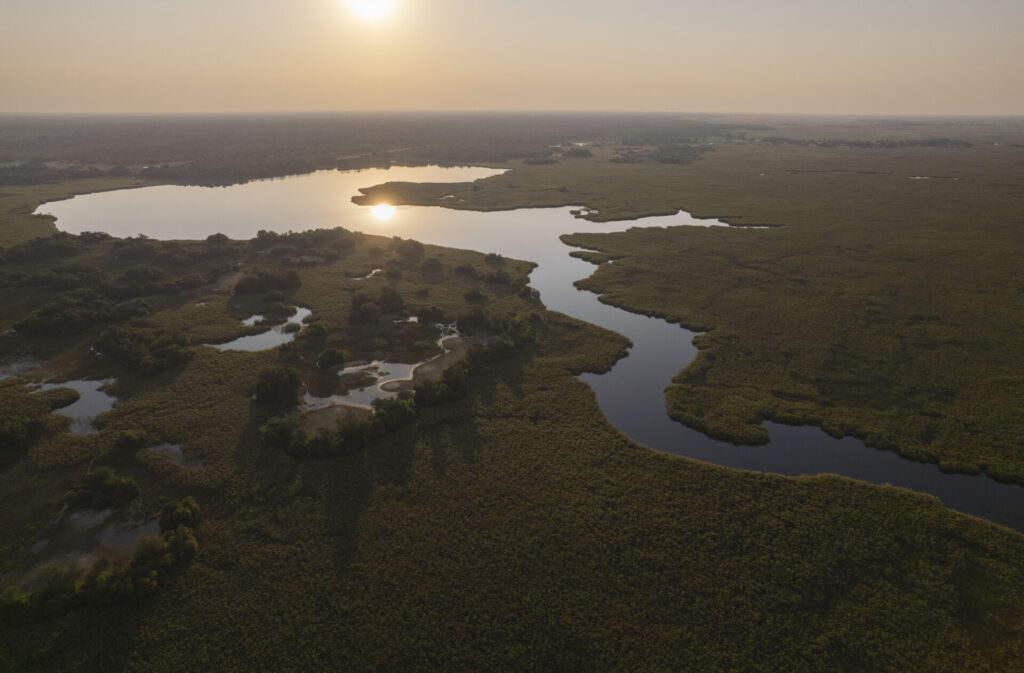
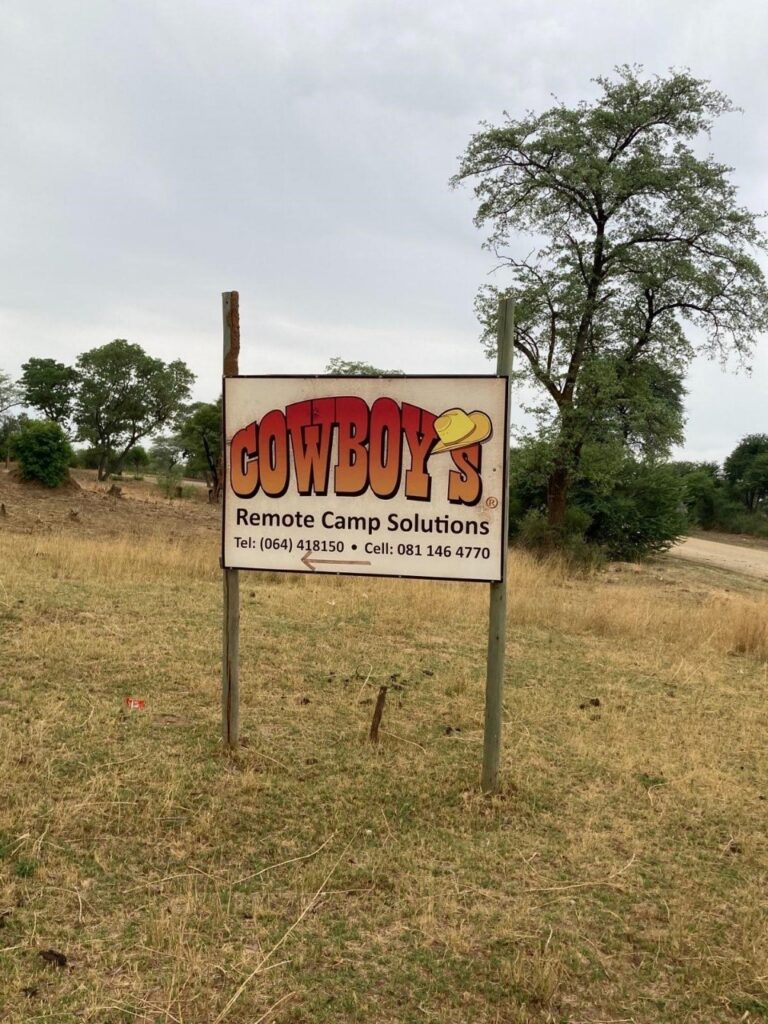
A three-year investigation by writers Jeffrey Barbee and Laurel Neme published in National Geographic unearthed many serious problems with ReconAfrica’s oil and gas drilling in the Okavango Delta watershed. The series of 11 stories exposed how the company “didn’t adequately consult with local communities about the full drilling plan as required by Namibian law; intimidated local opponents; violated its promise to line its drilling waste pits to prevent groundwater pollution; failed to secure legally required water and land permits; drilled inside the Kapinga Kamwalye Wildlife Conservancy without legal rights and bulldozed roads illegally through protected areas.” Barbee is also an author of this investigation.
ReconAfrica’s activities have also become a cause celebre, even drawing the attention of actor Leonardo DiCaprio and Prince Harry to argue against continued oil drilling in the Okavango region.
So far ReconAfrica has been unable to find commercial quantities of oil,
leading to accusations that this is a pump and dump share scheme, with investors told they might see staggering returns of up to 21,000%. This helped hype the company share price, allowing the original shareholders to make millions off naive mom-and-pop investors in North America. Several law enforcement agencies have investigated.
If there is going to be an oil boom in the Okavango, much of its wildlife, the local population and our climate could be in deep trouble. If it’s all a scam, then ReconAfrica insiders got rich quick on the back of misleading others. And at the center of the ReconAfrica scheme is one particular character, who, over the course of decades, has jetted around the world advising governments and businesses in oil-rich nations in his own quest to profit off of petrochemical riches.
Tucked away in what appears to be a posh address but is in fact a co-working space
in London’s Mayfair district are the offices of Park Energy Law, one of the world’s most influential energy law firms. It is from there that the company’s managing partner, James Jay Park, advises private oil and gas companies and, according to his website, “state-owned energy companies/governments on developing their petroleum regimes” in the Middle East and Africa.
Governments around the world are increasingly throwing vast resources at the conundrum of acting on climate change while still providing affordable energy to power-hungry consumers. They employ an army of advisers, mandarins and civil servants to guide them. In this complex geopolitical realm, Park’s public persona appears almost uniquely powerful. Park has been described by Who’s Who Legal as the world’s most “influential” energy lawyer and has been called a “kingmaker” for his efforts to shape legal frameworks and policy for billions of dollars of crude oil, much of it still in the ground.
Park once quoted Otto von Bismarck at an oil conference in Dubai, saying, “Laws are like sausages: you don’t want to know how they were made, you don’t want to know how the sausage machine works.” For Park, that lack of curiosity is a boon: In a series of apparent conflicts of interest spanning decades and continents, Park has played gourmet chef as well as his own chief customer, choosing the best “pork sausages” for himself and his associates. Most people would recognize this as a conflict of interest, but in some cases it appears Park may have been self-dealing, which is illegal in most jurisdictions.
According to his own website, Park claims he has “assisted governments and state oil companies in the design or amendment of petroleum regimes in 20 countries, whose resources comprise 49% of world oil reserves and 33% of world gas reserves.” In Africa alone, Park has advised the African Petroleum Producers Association, whose 18 governments control over 90% of the continent’s oil and gas production.
If his own hype is to be believed, Park has been essential in deciding what proportion of oil royalties a government gets and how many billions of barrels of crude a drilling company might acquire, and crucially, for how much.
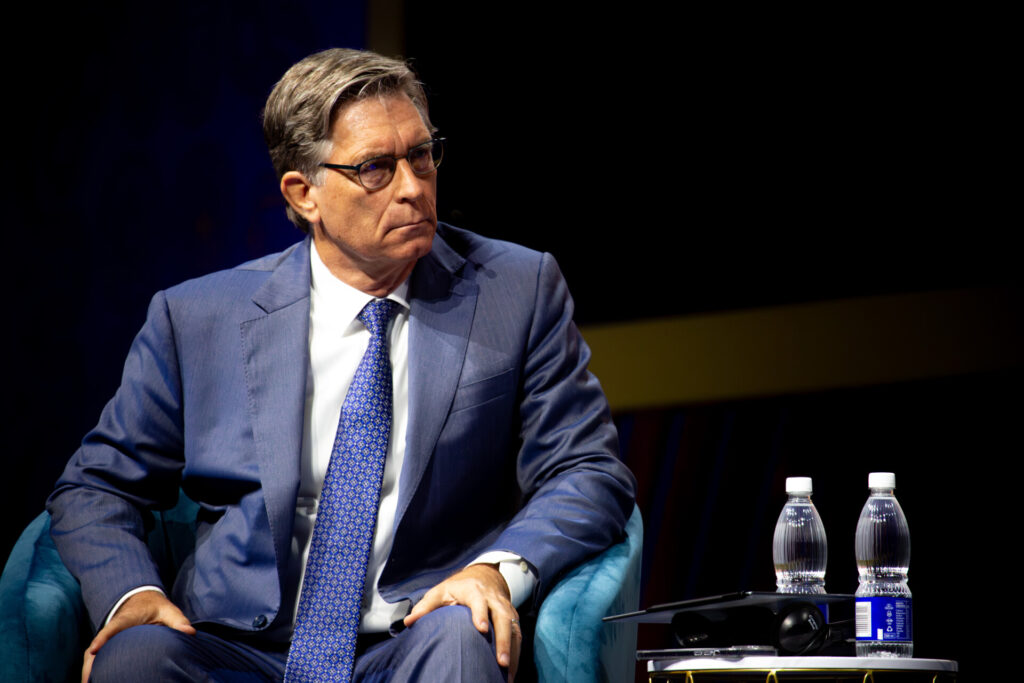
In an interview in 2018 with The Energy Year, Park stated that his law firm did not “act within a country for both the government and investors.” But Park’s own website has stated that he does indeed work with “both investors and states.” Our investigation has uncovered a clear pattern of Park advising governments and then setting up or advising companies in the same country, thereby benefiting directly from the oil regulations he helped draft.
Park did not respond to multiple requests for comment for this story.
Our team has found many instances — from Iraq and Somalia, Mexico, Chad, Tunisia and now Namibia — where Park helped governments create laws while advising companies in which he had an interest on how to benefit from those same laws. Some of these scandals have been investigated by the United Nations or government agencies like the Serious Fraud Office in the U.K., and others have resulted in convictions for some of Park’s erstwhile clients. In three countries — Chad, Tunisia and Namibia — companies associated with Park have also reportedly been investigated by the Royal Canadian Mounted Police.
So who is Park, the oil kingmaker you have never heard of? He may be London-based, but Park is a Canadian, born in Montreal. Oil runs through the family — his father, an ExxonMobil engineer, rose to become vice president of the company’s refinery division. Growing up he had summer jobs working for ExxonMobil’s subsidiary in Canada, Imperial Oil.
In 1980, the young lawyer went to work for the Canadian law firm Macleod Dixon, where he would work directly and peripherally in places like Russia for decades, helping that country as it sold off state resources to private firms. Since at least 2013 he has run two companies: Park Energy Law and Petroleum Regimes Advisory Limited. It is through these two companies that he has helped governments draft their own oil laws while also running companies that have directly benefited from those laws.
Park is a “King’s Counsel,” one of the highest honors a solicitor can attain in the U.K. It can take up to five years to earn the distinction and is seen as a legal badge of excellence. Despite this distinction, controversy, and sometimes conflict, seem to follow him.
One of Park’s major oil law crusades was prosecuted during the aftermath of the Iraq War, when many Western oil companies were keen to get a slice of the country’s massive oil reserves, roughly 10% of the global total.
As far back as the 1980s, ExxonMobil “considered Iraq a promising place, full of massive, under-exploited oil fields.” Shortly before the 2003 invasion, Chevron talked about “coveting the opportunity” to exploit the vast reserves. The company was not the only player drooling at billions of barrels of oil. So, too, were a number of small Canadian companies. And one lawyer in particular.
For Iraq’s nationalized reserves to be exploited by private companies, new laws had to be in place, and that’s where Park stepped in. He would later write a guest column in the Financial Times about how the country’s oil and gas treasures could be exploited by enacting these new laws.
The Kurdistan Regional Government (KRG), which controls the semi-autonomous region in Iraq’s northeast, was keen to exploit its share of Iraq’s sizable oil reserves, independent of what the government in Baghdad did. At the time, Kurdistan was seen as one of the last unexplored regions on the globe with the best prospects of discovering vast amounts of new oil. Even today the KRG asserts great control over its oil wealth — often at odds with the central government in Baghdad.


Officials from the KRG stated that they would not wait for a federal oil law before signing their own oil contracts. Over several months in 2006 and 2007, the Canadian firm Western Oil Sands, later to become WesternZagros, was in negotiation with the KRG over an Exploration and Production Sharing Agreement (EPSA) license. It would allow foreign companies like WesternZagros to privately develop Iraq’s untapped oil reserves.
WesternZagros was a client of Park’s through Macleod Dixon, where he was a senior partner. He was also, according to the U.S. Securities and Exchange Commission (SEC), a senior adviser to WesternZagros. Beginning at least as far back as 2006, Park represented and negotiated on behalf of the firm in its bid for the EPSA in Kurdistan.
U.S. government documents show that at the time Macleod Dixon was not only working for but also a shareholder in WesternZagros. On its website, WesternZagros claims that by 2020 it had “invested over US$500 million in the Kurdistan Region of Iraq.” According to the Independent newspaper, at the time that Park was representing WesternZagros, he was also helping the KRG write the oil law that would govern oil companies like WesternZagros. The newspaper noted that Park “was the author of oil legislation in … Kurdistan and has represented foreign companies and the KRG in contract negotiations.” When the KRG’s oil law was enacted in 2007, Park called it a “milestone.”
WesternZagros’ partner was another Canadian company, Talisman, which is also connected to Park’s old law firm in oil-rich Sudan. According to one Canadian paper, together Talisman and WesternZagros led “the industry’s push to start pumping money out of post-Saddam Iraq.”
Park would represent WesternZagros for at least four years. He wrote in 2011 for the Financial Times special supplement on Kurdistan oil and gas that he was still working as a lawyer for Macleod Dixon representing WesternZagros in Kurdistan. His bio for the piece states that “Mr Park provides advice and training for oil & gas companies, the federal Ministry of Oil and the Kurdistan Regional Government.” He still backed the KRG for having drafted its own law. Park wrote that “petroleum is a matter where the regional governments have authority.”
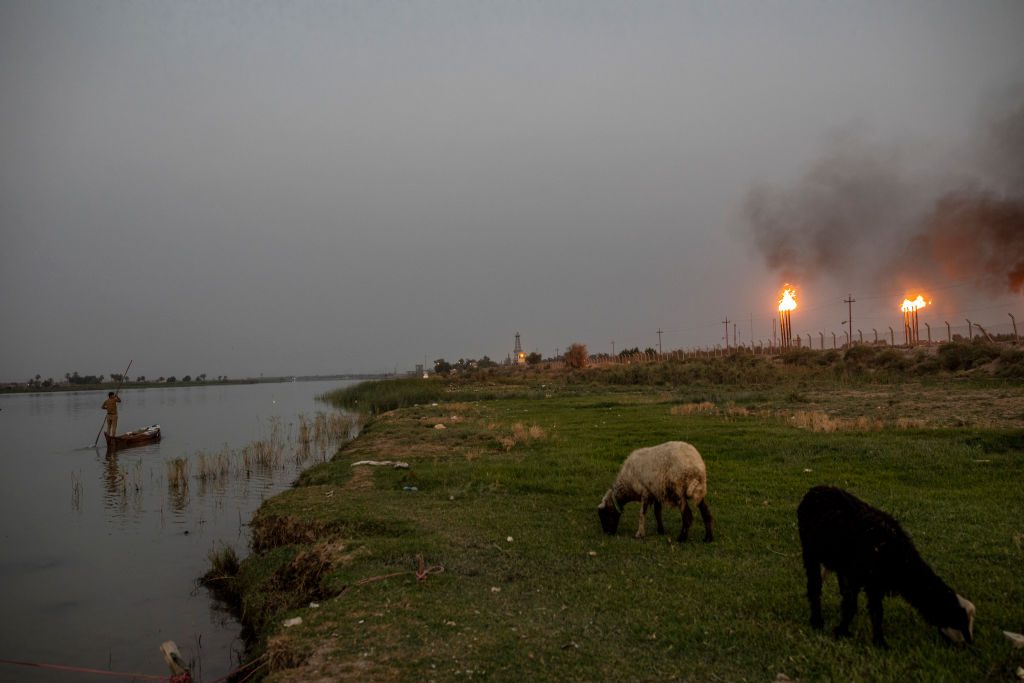
Park was not just working for the KRG but also for Iraqi officials in Baghdad at the Ministry of Oil.
Park had become the Iraqi oil law expert. One senior Iraqi official, an adviser to the Ministry of Oil and the Iraqi prime minister, told a freelance journalist working for the Independent that Park “knows more than we do about the oil law.”
Park would become such an authority on Iraq and its oil laws that he was a regular speaker for years at Iraqi oil conferences in London, Kurdistan and Dubai. These were the prime events where oil bosses could schmooze with key politicians from the region.
At these meetings, Park was the expert everyone was listening to. In 2008, for example, he spoke at a two-day conference along with senior Iraqi dignitaries in an upmarket hotel in London. His talk, according to the conference agenda, outlined “business opportunities & risks to the audience.” The following day he led a workshop on understanding the petroleum regime in Iraq, where he argued that the current Iraqi oil law was not enough for the country’s investors.
Greg Muttitt, who wrote the definitive book on oil and Iraq, “Fuel on the Fire,” and is now a senior associate at the International Institute for Sustainable Development, was at the meeting. “There is no doubt that what Park was advocating for was hugely beneficial to companies in a significant way,” recalled Muttitt in a recent interview for this investigation. “In Iraq, for example, he was setting up a legal structure to protect companies from the government, even if the government wanted to act to protect the Iraqi public interest.” He noted that “it could set a massive precedent for other countries.”
According to Muttitt and others, the real problem with the new Iraqi oil law that Park and others were advocating for was that it would replace what was once a well-run state enterprise with almost complete control by foreign companies over the country’s vast oil wealth. Since it was enacted in 2007, the Kurdistan law has remained highly controversial because the central government in Baghdad believed that the KRG law was “unconstitutional and invalid” and that it, not the KRG, should control the country’s oil exports. In the end, though, the Baghdad government would not agree to Park’s oil legislation, setting up the current issue of who controls Iraq’s oil-rich north — with the KRG still using the legal framework set up by Park and others against Baghdad’s assertion that the current KRG oil law is not legal.
As the Kurds exported their oil via Turkey and Iran, the central government threatened to blacklist any buyers of Kurdish crude, with the threat of tankers being seized in the U.S. or Canada. By 2012, the federal government commenced legal proceedings against the KRG.
It would take 10 years for the Iraqi Supreme Court to finally rule, in 2022, in favor of the Iraqi central government that revenue from the country’s oil and gas must be fairly distributed, regardless of where it is found. It added that the KRG law, the one that Park says he advised on, was unconstitutional.
Being paid to help create a legal framework for oil and gas and then making money by advising companies on how to get huge contracts within that same framework is potentially a serious conflict of interest. But it was only in another war-torn country, this time on the horn of Africa, that Park’s conflict of interest was deemed serious enough to attract some of the most powerful regulators in the world.
When war-ravaged Somalia wanted someone to craft its new oil laws, it too turned to Park.
In 2006, the Canadian Globe and Mail reported how Park and business associate Thomas Valentine had been hired by the country’s fledgling government to “design a credible petroleum regime that can attract investors.” That year official documents listed Park and Valentine as advisers to the Somali government. Also advising the Somalis were senior officials from Kuwait Energy. Park, who had already been advising the Kuwaiti government on oil contracts, would continue to advise the Somali government for nearly a decade, until at least 2015.
Park told the paper: “This is one of the poorest countries in the world, but it may be sitting on some of the greatest oil and gas treasures. We need to ensure that Somalia can take advantage of its resources without succumbing to the resource curse of corruption, conflict and violence.” Ironically, Park’s career, especially in war-ravaged Somalia, has been dogged by accusations of corruption, dodgy deals, and collaboration with oligarchs and businesses linked to Russian President Vladimir Putin. Park’s activities and those of his associates have resulted in numerous red flags, including an investigation by the U.K.’s Serious Fraud Office into a company he represented named Soma Oil & Gas. He has also been singled out for condemnation by the United Nations Security Council.
According to the 2015 Security Council report, “Soma paid close to half a million dollars to an ostensibly independent legal advisor to the Ministry, J. Jay Park.” The problem, according to the U.N., was that this payment was made while Park “served as an oil and gas advisor for the Somali Transitional Federal Government.” The same government, the U.N. notes, gave Park’s other employer, Soma Oil & Gas, huge oil drilling blocks offshore.
Prior to those contracts, Soma Oil & Gas was unknown in the oil industry. It had only been incorporated the month before, in April 2013, and was a client of Park’s. The chair of the company was Lord Michael Howard, the former leader of the U.K.’s Conservative Party. Howard would later write that he accepted the appointment “with the encouragement” of the Foreign & Commonwealth Office (FCO), the British equivalent of the U.S. State Department. A senior official at the FCO also gave Howard a private briefing on the security situation in the country before traveling. It was one of at least 11 meetings held between Soma Oil & Gas and FCO officials in 2013.
A prescient memo from what was at the time known as the U.K. Department for International Development, uncovered by BBC Newsnight, said the deal could “lead to all sorts of irregularities which are very hard to resolve later. Getting it wrong could fuel corruption or even conflict.”
The U.N. report further noted that “despite the fact that Park’s payment was contingent on the Ministry signing the SOA [Strategic Operating Agreement] — Soma had no reason to pay his fees otherwise — both Soma and Park have maintained that their arrangement did not represent a conflict of interest.”
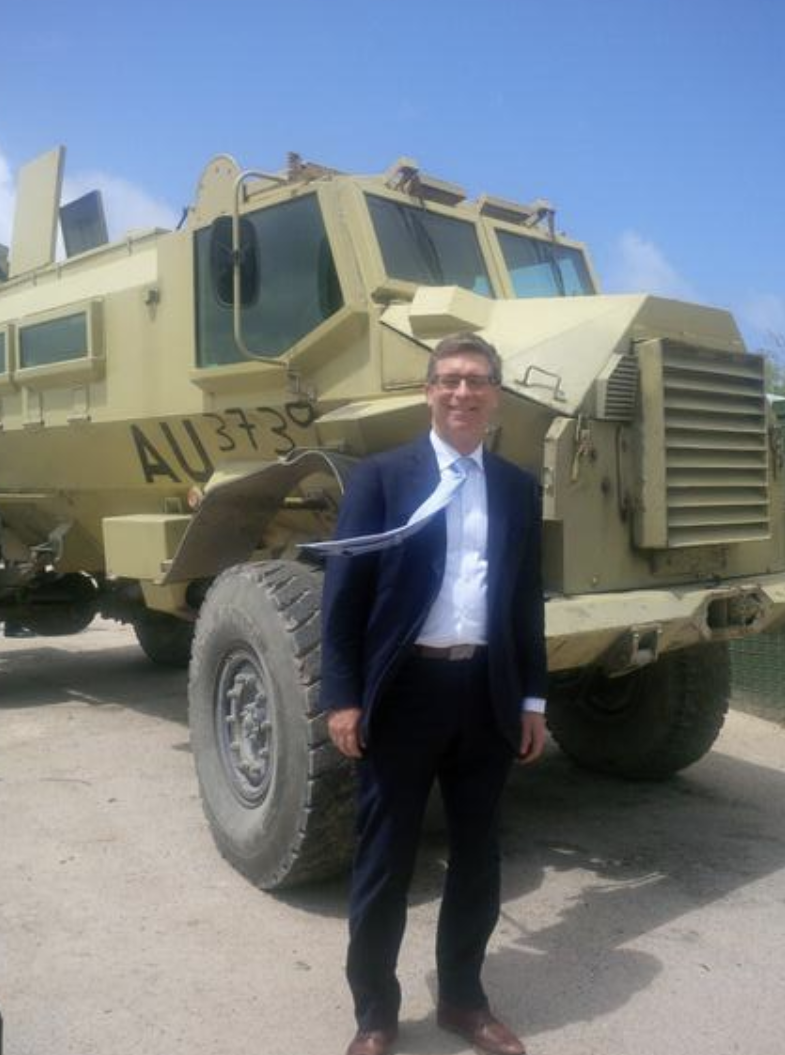
Soma Oil & Gas was funded in part with a $50 million check from a company called Winter Sky, which is owned by a Russian-Georgian oligarch named Alexander Dzhaparidze. According to an investigation by the Russian Telegraph newspaper, Dzhaparidze, the owner of a 272-foot $170 million super yacht, made his money working with the Russian state-affiliated company Lukoil. He would later appear on the U.S. government’s “Putin list” of business and political figures close to the Russian president.
Park’s colleague working for the Somali government who was also drafting the law was Frenchman Patrick Molliere, head of Aldric Global of Singapore. Park was the Somali government’s legal adviser on oil matters.
Molliere would later write on the Somali news website Hiiraan that Hassan Ali Khaire, Somalia’s future prime minister, directed Park and Abdullahi Haider, a special adviser at the natural resources ministry, “to draft an agreement with Soma Oil, a company represented by Khaire himself.” Molliere alleges that when they signed the agreement in May 2013, “I was enraged because this was not only out of the norm but also completely illegal and would derail our efforts to ensure that the petroleum development was beneficial to the Somali people. I checked, and Soma Oil had shareholders who were BVI [British Virgin Islands] companies concealing the true owners.” Although self-dealing is illegal in many jurisdictions, it is unclear which jurisdiction Molliere was referring to.
The Security Council’s report also said that the U.N. has “obtained evidence demonstrating that Soma has been making regular payments since June 2014 to civil servants in the Ministry of Petroleum and Mineral Resources, some of whom were instrumental in both securing the company’s initial contract, and negotiating subsequent agreements.”
The U.N. monitoring group believed these payments made by Soma Oil & Gas to senior Somali government officials “undermined public institutions through corruption.”
The U.N. also found that the “Capacity Building Agreement” set up by Soma Oil & Gas and Park was likely part of a quid pro quo arrangement, whereby the ministry would “protect” Soma Oil & Gas from the potential negative consequences of any upcoming government reviews of its licenses and contracts. At least six officials on Soma Oil & Gas’ “capacity building” payroll simultaneously drew Somali government civil servant salaries.
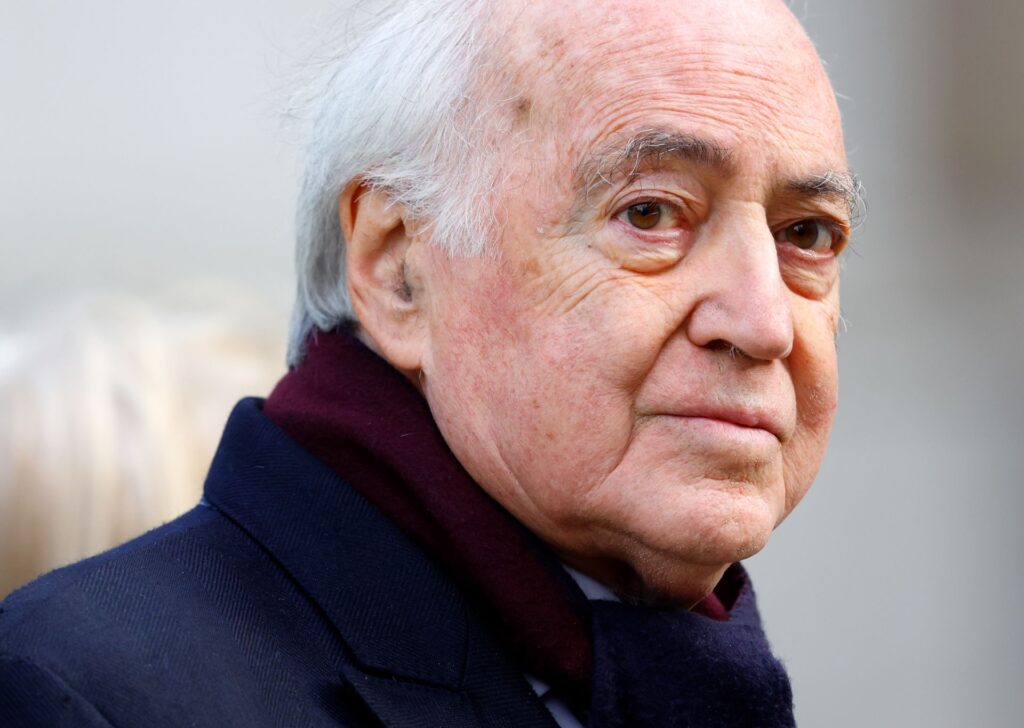
As in Iraq, Park’s conflict of interest in Somalia fueled regional tensions that are still simmering.
When the Somali government granted Soma Oil & Gas a series of oil exploration blocks offshore, Kenya sued Somalia in the International Court of Justice in 2014 for what it says is theft of its own offshore drilling area.
In the Kenyan government’s nearly 600-page memorandum to the International Court of Justice, Park is again noted for taking half a million dollars from Soma Oil & Gas while he was an official adviser to Somalia’s government.
The document quoted the Security Council report, which also noted that the contract to award Soma Oil & Gas most of Somalia’s offshore oil blocks “has never been made public, nor was it approved by the Federal Parliament of Somalia.” Kenya’s memorandum to the court also directly outlined how “Jay Park, a Canadian lawyer who is managing partner of Petroleum Regimes’ Advisory and Park Energy Law,” was at the law’s signing ceremony accompanied by Abdirizak Omar Mohamed, then the minister of natural resources of Somalia.
The Soma Oil & Gas deal was also opposed by local experts, including the East African Energy Forum (EAEF), a group of Somali resource experts and lawyers who said the deal to award the offshore contract to Soma Oil & Gas “goes against the very principle of transparency and anti-corruption that this government took an oath on last year. We are surprised at the cloud of secrecy and ‘behind-closed-doors’ methodology this [Somali] government believes they can deal our natural resources in.” In 2013, BBC Monitoring reported that “The EAEF has called on the central government to cancel the Soma Oil & Gas deal immediately.”
The International Court of Justice case between Somalia and Kenya was concluded in 2021. The ruling split the disputed offshore territory with a slight favor to Somalia. Kenya, disputing the result, has been drilling there as recently as 2022, setting up a regional conflict that remains unresolved.
According to the East African newspaper, in 2022 many of the offshore blocks in the dispute were snapped up by a new company called Coastline Exploration, run by one of the original financial backers of Soma Oil & Gas, the Russian-Georgian oligarch Dzhaparidze. According to Voice of America, in April 2022 Mohamed Hussein Roble, then the Somali prime minister, called the deal with Coastline Exploration “null and void” because it went against Somali law. Yet six months later, in October, the company posted an update that the agreement had been signed off by the president of Somalia, Hassan Sheikh Mohamud. Currently Coastline Exploration says it is conducting seismic tests offshore with a plan to potentially start drilling in 2025.
Despite the U.K. Serious Fraud Office’s yearslong investigation into the original deal between Soma Oil & Gas and the Somali government, it concluded in 2016 that “there is insufficient evidence to provide a realistic prospect of conviction” in the case. This said, in its statement, the Serious Fraud Office added that although “there were reasonable grounds to suspect the commission of offences involving corruption, a detailed review of the available evidence led us to the conclusion that the alleged conduct, even if proven and taken at its highest, would not meet the evidential test required to mount a prosecution for an offence.”
Though he styles himself as having a Midas touch in the industry, Park’s ambitions often led him to pursue ventures on speculation,
creating companies to exploit unproven reserves that are more imaginative than material while driving up the stock price of businesses he is involved in.
The investigative financial research group Viceroy Research noted in 2021 that Park was “implicated in the bribery of officials at previous exploration ventures in Chad, Tunisia and Somalia. These ventures promised huge strikes but failed to deliver, leaving investors holding the bag.”
What happened in Chad and Tunisia is a rare look under the covers of how Park and others like him use a veneer of respectability, along with shell companies and potential bribes to regulators to get paid to drill for oil, whether or not it is even there.
In the late 2000s, Park was legal counsel, general secretary, chair and director of Voyageur Oil and Gas Corp., which was exploring for oil in Tunisia. Park also happened to hold 175,000 shares in the company. In 2009, the controversial businessperson Slim Chiboub, the son-in-law of former Tunisian President Zine El Abidine Ben Ali, invested $5 million in Voyageur Oil and Gas after the company got into financial difficulty.
Relations between Voyageur Oil and Gas and Chiboub soured, leading to legal action between the two parties. Emails released in that action revealed that Park was telling colleagues that this could be a huge oil find. “If this proves to be as big as we all believe, the development activity is likely to involve a player with more resources and experience.” (While chair of ReconAfrica in Namibia, Park was paying what appear to be independent websites like Oilprice.com to tell the investing public that there were billions of barrels of oil just waiting to be pumped up, when the only thing ReconAfrica has pumped to date is hype.)
There were no commercial quantities of oil in Tunisia, but Park’s venture there still yielded him a profit. In 2011, Voyageur Oil and Gas agreed to sell 80% of its interest in its Tunisian field to a subsidiary of Anadarko Petroleum Corp. This sale was handled by the legal firm Macleod Dixon, where Park worked at the time. The money was paid from Anadarko Petroleum via Macleod Dixon to companies controlled by Chiboub.
The timing of the transactions is revealing. Ben Ali was ousted in the first revolution of the Arab Spring in January of 2011. In March that year a law was passed to confiscate the property of Ben Ali and his relatives, including Chiboub. In May, Voyageur Oil and Gas claimed that it reported Chiboub’s shareholding to the Tunisian Confiscation Commission and Canadian officials. Despite this, in August, five months after the decree, his shares were still sold. Chiboub would later be arrested on charges of corruption and money laundering, and was named in an EU Council regulation as a person who was “responsible for the misappropriation of Tunisian State funds, who are thus depriving the Tunisian people of the benefits of the sustainable development of their economy and society and undermining the development of democracy in the country.”
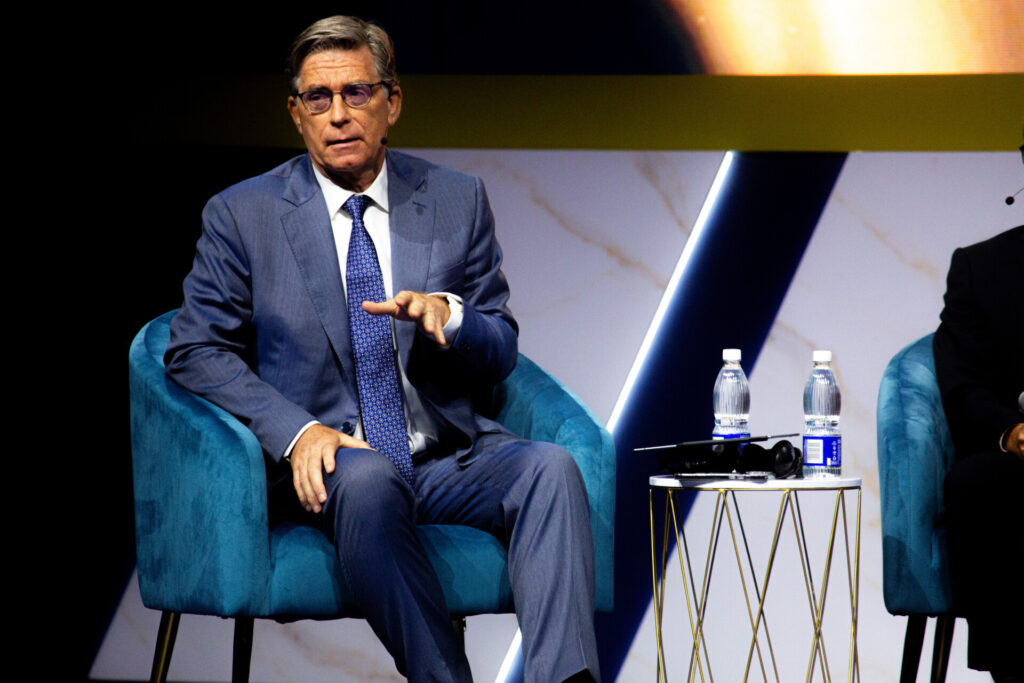
Tunisia was just one place where Park set up shop around a big oil play that went dry.
He also attempted to make a play in the central African nation of Chad, but the deal went south and ended up in a U.S. court.
In 2009, according to the U.S. Department of Justice, the founders of Canadian-based Griffiths Energy, whom Park worked for, agreed to pay Mahamoud Adam Bechir, Chad’s ambassador to the U.S. and Canada at the time, along with his associates, $2 million and shares in an apparent exchange for Bechir exercising his official influence over the award to the company of lucrative oil development rights in Chad.
Legal proceedings in the U.S. would later uncover that Griffiths’ owner, Brad Griffiths, and his business partner Naeem Tyab essentially paid Bechir $2 million in “unlawful assistance in securing the development rights to oil blocks in Chad.”
Documents from the case show that Park’s law firm Macleod Dixon, which also worked for Griffiths Energy, transferred the $2 million to an account held in a front company called Chad Oil Consultants in Washington, run by the ambassador’s wife. At the time, Park was leading the Macleod Dixon operations, whose offices were raided by the Canadian police. In its defense, the chair of Norton Rose, which took over Macleod Dixon, said: “We had no knowledge that there were foreign public officials involved in the payment. … We were directed to make a payment to Chad Oil Consulting LLC that already had a consulting agreement with Griffiths.”
In January 2013, Griffiths Energy was fined 10.35 million Canadian dollars in a Calgary court after admitting that it had attempted to bribe Chadian officials to win its oil and gas exploration license. Later, one of the lawyers representing one of the Griffith founders, Tyab, said his clients “were acting under the advice of counsel” when they made the payment to the diplomat’s wife. At least one of those lawyers was Park.
Beyond Somalia, Chad, Iraq and Tunisia, there are other examples in Africa where Park has acted for companies and governments in the same country.
Park claims he has advised the African Petroleum Producers Association, which represents 18 African governments, regarding model petroleum laws and contracts. In a third of those countries — Chad, Congo, Egypt, Libya, Namibia and Senegal — he says he has also advised companies operating there.
In the past three years it is Park’s work in Namibia where his actions have again come under the spotlight. The lawyer was instrumental in setting up the Canadian oil exploration company ReconAfrica, but again he has also been advising the government on its oil laws. He has been with the company since its inception and has been at various times its CEO, chair, a director, a major shareholder and now its legal adviser.
According to Namibian lawyer Uno Katjipuka, who led a high-profile investigation into illegal fishing contracts with EU fishing companies that brought down three Namibian cabinet ministers, Park is advising the Namibian government on its new oil and gas legislation. According to her sources, Park’s role could go beyond just advising, with him possibly “in charge of the process of drafting the oil legislation.”
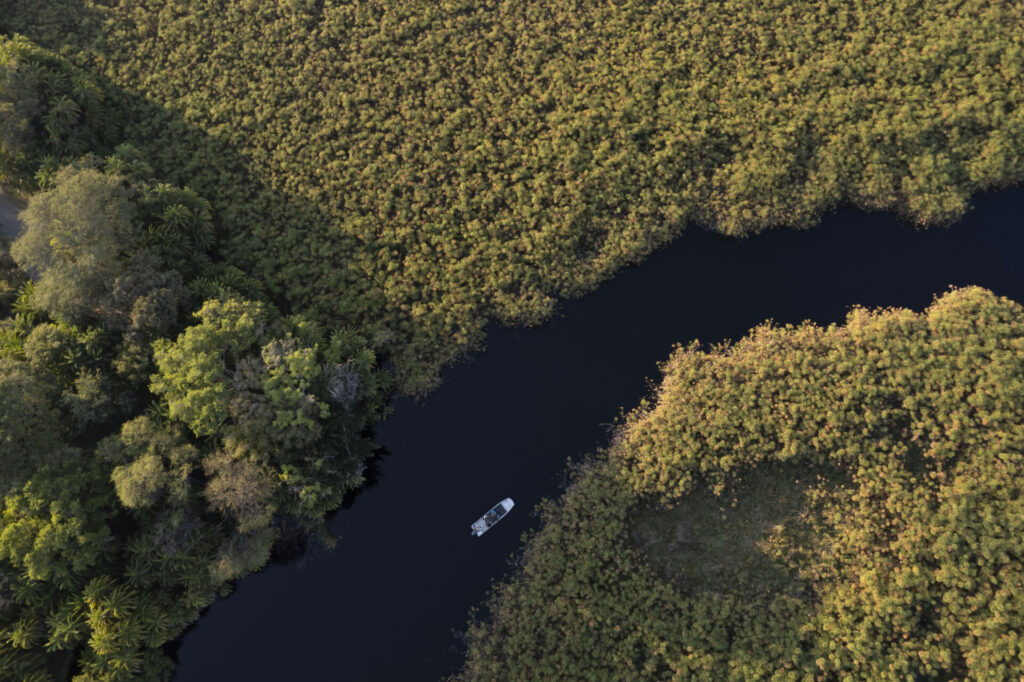
That oil legislation is needed, according to Katjipuka, to govern the two massive new offshore oil and gas discoveries by TotalEnergies and Shell, as well as any onshore discoveries if companies like ReconAfrica do find any recoverable oil.
In a 2020 interview with Global Business Reports, Park said he “formed part of the initial investment team of ReconAfrica in 2015” and (at that time) was chair of the board. The other founder of ReconAfrica, Craig Steinke, would later tell investors that Park had been central to the company’s efforts to develop close relations with the Namibian Energy Ministry.
“He’s done a wonderful job integrating the company with the Ministry,” Steinke said.
When he stepped down from the board in 2022, ReconAfrica announced: “Mr. Park will continue to take the leading role in advising ReconAfrica on all oil and gas legal matters through Park Energy Law where he is Managing Partner.” As of February 2024 Park was the company’s second-largest shareholder, with over 3 million shares. Steinke remains the largest shareholder, with nearly 5 million shares. The company is traded on the over-the-counter (OTC) market in the United States, often referred to as the penny stock exchange, as well as the Frankfurt Stock Exchange and the Toronto Stock Exchange.
ReconAfrica appears to be little different from some of Park’s other ventures
selling investors a quick buck based on hype while embroiled in bitter controversy and conflicts of interest. In 2014 Park and two other colleagues, including Steinke, acquired the drilling rights to 6.3 million acres in northern Namibia in the watershed of the Okavango Delta. Steinke also acquired another license for $23,000 in neighboring Botswana and later, through a series of shell companies, sold it to ReconAfrica for a tidy $31 million profit, despite the fact that the company has found no oil and never drilled in that area.

In an interview in 2019 at the 121 Oil and Gas Investment conference in London, Park claimed that his geologist has said that “there is no basin in the world this deep, this large, that does not produce commercial quantities of oil and gas.” The oil industry journal Upstream Online noted in 2020 that Park hoped the company’s drilling campaign “would confirm the presence of some 12 billion barrels of oil in place before the end of the year.”
A profile piece in African Intelligence, published in January 2021, when Park was still chair of ReconAfrica, noted how the Canadian lawyer “hopes to turn the Namibian desert into a new Texas.” Two years later, in 2023, Park told Impact Wealth that ReconAfrica “knew this was a once-in-a-lifetime opportunity,” and that we “were very fortunate to acquire the data before our competitors, and we were able to work with the government there to situate ourselves as leaders in the region.”
ReconAfrica launched an aggressive online marketing campaign, and investors piled in with cash, hoping to strike it rich in Park’s “biggest oil find of the decade.” By July 2021, the company was worth nearly $1 billion.

Today there is no evidence of commercial quantities of oil in the Okavango watershed,
despite the inflationary claims put forward by Park and the rest of ReconAfrica’s leadership. However the company’s new CEO, Brian Reinsborough, is confident that they will find oil, stating in a December 2023 press release that the company is going to drill many more wells by “executing our multi-well program in 2024.”
It did not take long before the backlash to ReconAfrica’s drilling in this world-famous ecosystem started. ReconAfrica is now facing a class-action lawsuit in New York that alleges that it had concealed crucial information about the data on its first two oil and gas test wells using deceptive stock promotion, while senior executives sold shares when the stock price was artificially high.
On April 23, 2023, a U.S. federal court denied ReconAfrica’s motion to dismiss the U.S. shareholder class-action claims, and the company was ordered to file an answer to the complaint that it previously misled investors. Then, on Feb. 28, 2024, a new ReconAfrica press release claimed that the company had come to a settlement agreement with the disgruntled investors who filed the complaint, but that “the Settlement will not be final unless both courts grant final approval.” The company’s press release went on to say that any settlement will be covered by their insurance and that “none of the Defendants are admitting any liability, wrongdoing, or fault as part of the Settlement.”
Why would Park, who seems to hover around potential large oil discoveries, writing laws that he and his associates can benefit from, put so much of himself into what appears to be a pump-and-dump scheme?
The huge international interest and outrage about ReconAfrica’s drilling program has shone a bright light on Park and his enablers’ work in Namibia, illuminating a business that has generally been conducted in the shadows. Park’s continuing role in providing services to both governments and oil companies has been noted before, but the hunt for new oil resources is heating up in places like Namibia, where huge, proven offshore oil discoveries could release vast amounts of wealth into this country of around 2 million people. It is here, and in other African countries that do not yet have strong barricades against corruption, that his skills have been celebrated by industry and governments alike.
One possible answer to Park’s ReconAfrica oil play may be that he believed it to be true, and now that it hasn’t panned out, he exited the board. He remains the company’s second-largest shareholder, though without the “working petroleum system” that drove the stock value to more than $10 a share, his investment is worth significantly less. Today it trades under $1, having fallen 25% in the past year.
Park, through ReconAfrica, hosted oil and gas industry talks like Africa Energy Week in Cape Town, South Africa, in October 2023. Addressing the crowd at his panel discussion, called “Africa’s Exploration Champions,” Park declared that “as a petroleum lawyer what I often see in many jurisdictions is that you have a petroleum regulator. But that is only part of what a government does to regulate activities.” He went on to note that there was also “red tape” for oil explorers, like government departments in charge of “the environment, forestry, roads and water and so on.”
But Park said he has a solution to these problems: “Finding a way to bring that together, and have kind of a single window regulation, one stop shopping if you will, this can really help drive exploration and development activity.” Essentially, he said with a huge smile, just rewrite a master petroleum law to make it easier, as he put it, to “drill, baby, drill.”
None of the investigations into Park by oversight groups like the U.N. or governmental agencies has ever led to a conviction for breaking the law. From London to the conflict-torn Sahel region of Africa, he still has full rein.
Even as ReconAfrica continues its speculation in Namibia, Park has moved on to new oil and gas ventures, where once again it seems hype is in overdrive. He is currently chair of MCF Energy, a company that is promising to “solve Europe’s energy crisis” by exploiting what they’ve called two “massive Western European oil and gas” prospects where they’re currently preparing to test drill. Company executives say they haven’t seen such a great business opportunity in 40 years. It is drill, baby, drill once again.
One paid advertorial for MCF Energy notes that Park “has a solid track record of boosting oil deposit values.” And maybe that is part of the trick. Because he is seen as such a global expert on oil laws, simply having him on the board “boosts” oil values whether or not there is any oil there.
Meanwhile, floods, hurricanes, wildfires and other climate-driven catastrophes are already disrupting life as we know it. Scientists agree that these are avoidable problems, directly driven by our rampant exploitation of fossil fuels.
Most people know that huge oil companies have known about and distorted the facts about the dangers of their products for decades.
But the backstory of how the world came to this place, where vested interests manipulate the political process and then profit handsomely from it, is vital to understand if humanity is to stop drilling for oil and meet our global energy demands in a more sustainable way.
Thomas Muronga is the leader of the Kapinga Kamwalye Wildlife Conservancy, a protected region where ReconAfrica has been drilling illegally for more than two years. He is angry that ReconAfrica ever arrived in Namibia: “Africa is not for sale, and our lands and our farms and water systems are not sacrifice zones for foreign companies to come and pollute. Those days of colonialism are over, we need sustainable development. We need renewable energy.”
Despite this, ReconAfrica drills on. In July 2023, the company announced it had received authorization from the Namibian Ministry of Environment, Forestry and Tourism to drill 12 more wells. Approval is not yet a done deal, with ReconAfrica now seeking permission from the Namibian authorities to amend that authorization license. In August 2023 ReconAfrica appointed their new CEO, Reinsborough, whom the company calls a “visionary executive” and an “industry pioneer.” The former ExxonMobil executive also brought in new board members and a new technical team, describing the company as ReconAfrica 2.0 to investors.
The company says they plan to drill at least 12 new wells in 2024 for oil and gas and hopes to start drilling by the end of the first quarter. It appears 2024 will be the year that decides the future of the Okavango Delta and whether Park, as one of ReconAfrica’s major shareholders, makes millions while the world is left to face the consequences of our oil addiction in this, the petrochemical epoch.
This investigation was co-produced with a research grant from allianceearth.org, a foundation funding science and environmental reporting.
This article was published in the Spring 2024 issue of New Lines‘ print edition.
Become a member today to receive access to all our paywalled essays and the best of New Lines delivered to your inbox through our newsletters.



